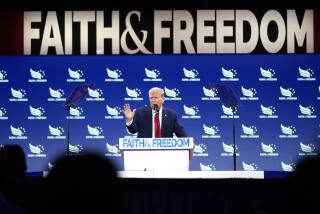Reaganâs Use of Gospel in Arms Debate Questioned
WASHINGTON â President Reagan may have misused the Gospel of Luke this week when he invoked Jesus in support of a strong defense budget and avoiding peace terms from a position of weakness.
âThe President is dead wrong,â said Warren Wiersbe, general director of the âBack to the Bibleâ radio program.
âHe sort of yanked it out of context,â commented Father Joseph Fitzmyer, S.J., author of the two-volume Anchor Bible commentary on Luke.
Reagan cited Luke 14:31-32 twice Monday. In arguing before businessmen at the White House for his military buildup, he said they might be interested âto know that the Scriptures are on our side on this.â
Later, he âremindedâ the National Religious Broadcasters Convention here what Jesus said:
âOr what king, when he sets out to meet another king in battle, will not first sit down and take counsel whether he is strong enough with 10,000 men to encounter the one coming against him with 20,000? Or else, while the other is still far away, sends a delegation and asks the terms of peace?â
Reagan added: âI donât think the Lord that blessed this country as no other country has ever been blessed intends for us to have to some day negotiate because of our weakness.â
Although Luke 14:31-32 could be interpreted to mean that peace negotiations are prudent when one is outnumbered, Reagan told the business representatives, âWell, I donât think we ever want to be in a position of only being half as strong and having to send a delegation to negotiate under those circumstances peace terms with the Soviet Union.â
Both Wiersbe and Fitzmyer, however, said in separate interviews that Jesusâ saying is not a lesson on prudence but on the preparedness of his followers for what was ahead.
Verses 31-32 are preceded by a similar parable about a man who built a tower without calculating the cost. Both stories in turn are bracketed by Jesusâ sayings on the demands of discipleship. They are, as Fitzmyer paraphrased them, willingness to leave family ties, to face radical self-denial and to give up material possessions.
âTo erect (Luke 14:31-32) into a principle of national defense--that bothers me,â said Fitzmyer, a Catholic University professor who has been editor of both the Journal of Biblical Literature and the Catholic Biblical Quarterly.
The religious and cultural flavor of words spoken at the 42nd annual National Religious Broadcasters Convention can be illustrated partly by two Los Angeles representatives who spoke at plenary sessions.
The Rev. E. V. Hill, pastor of Mt. Zion Missionary Baptist Church, admonished broadcasters in general against using their technical skills simply for the sake of âglamour, glitter and fame.â
But Hill also defended--without mentioning his name--television evangelist Jim Bakker who has been criticized after it was disclosed that he purchased a Palm Desert, Calif., house and expensive cars while pleading on the air that his PTL (Praise The Lord) Television Network was struggling for funding.
âWe must learn not to speak about a brother unless we speak to a brother first,â Hill said. The Los Angeles pastor added, âA $400,000 home in California is not considered extravagant.â
Hill delivered one of the prayers at the Republican National Convention last year and may be the leading black preacher in the so-called Religious Right. He shared the platform Tuesday night with Phyliss Schlafly, known for her active opposition to the equal rights amendment.
He contended that white, evangelical fundamentalists have not usually received proper credit for their good work. âHumanism and evolution would have been our national faith if fundamentalists had not said, âThatâs far enough!ââ
Pat Boone, another popular figure with conservative Protestants, sang several songs in his appearance, including one praising America, one defending âbeing squareâ and one against abortion titled âLet Me Live.â
In introducing the latter song, Boone said the audience was about to hear from âour youngest constituency.â The entertainer was joined by childrenâs voices from the recordâs sound track--representing what Boone said are âthoughtsâ of unborn babies at different stages of pregnancy.
The video version of the song--complete with in-womb photographs of fetuses--has been shown on Christian Broadcasting Network and PTL network, said John McEntee of CBN.
âAt three months, the voice says, âI have fingers now, Mommyâ,â McEntee said. The song ends with an abortion. âItâs a tear-jerker,â McEntee said. âI start to weep when I think about it.â
More to Read
Sign up for Essential California
The most important California stories and recommendations in your inbox every morning.
You may occasionally receive promotional content from the Los Angeles Times.










